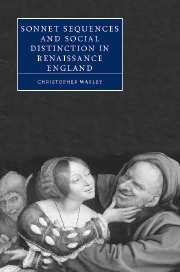Book contents
- Frontmatter
- Contents
- Preface
- 1 Sonnet sequences and social distinction
- 2 Post-romantic lyric: class and the critical apparatus of sonnet conventions
- 3 “An Englishe box”: Calvinism and commodities in Anne Lok's A Meditation of a Penitent Sinner
- 4 “Nobler desires” and Sidney's Astrophil and Stella
- 5 “So plenty makes me poore”: Ireland, capitalism, and class in Spenser's Amoretti and Epithalamion
- 6 “Till my bad angel fire my good one out”: engendering economic expertise in Shakespeare's Sonnets
- 7 “The English straine”: absolutism, class, and Drayton's Ideas, 1594–1619
- Afterword: Engendering class: Drayton, Wroth, Milton, and the genesis of the public sphere
- Notes
- Index
- Cambridge Studies in Renaissance Literature and Culture
Preface
Published online by Cambridge University Press: 22 September 2009
- Frontmatter
- Contents
- Preface
- 1 Sonnet sequences and social distinction
- 2 Post-romantic lyric: class and the critical apparatus of sonnet conventions
- 3 “An Englishe box”: Calvinism and commodities in Anne Lok's A Meditation of a Penitent Sinner
- 4 “Nobler desires” and Sidney's Astrophil and Stella
- 5 “So plenty makes me poore”: Ireland, capitalism, and class in Spenser's Amoretti and Epithalamion
- 6 “Till my bad angel fire my good one out”: engendering economic expertise in Shakespeare's Sonnets
- 7 “The English straine”: absolutism, class, and Drayton's Ideas, 1594–1619
- Afterword: Engendering class: Drayton, Wroth, Milton, and the genesis of the public sphere
- Notes
- Index
- Cambridge Studies in Renaissance Literature and Culture
Summary
“Self-consciousness exists in and for itself when, and by the fact that, it so exists for another”: Hegel's famous first phrase from section 178 of The Phenomenology of Spirit, upon which so much twentieth-century critical theory rests, would not have exactly seemed news to Renaissance love poets, who had been writing their own version of a master-slave dialectic in the poetry that dominated Europe for hundreds of years. I have no evidence that Hegel actually paid any attention to sonnet sequences, but his understanding of the interpenetration of subject and object has, for me, an obvious precedent in the dynamics of Renaissance sonnet sequences. The “subject and object problem,” what Ernst Cassirer called the “striving” basic to the platonic and neo-platonic doctrine of eros, formed the background in one way or another of most Renaissance love poetry. Thanks to Joel Fineman's Shakespeare's Perjured Eye, the location of sonnets in such a philosophical trajectory is largely secure. What is less clear is the story of the participation of sonnet sequences in the production of specific social positions. If Renaissance sonneteers would recognize Hegel's argument, they would have also found familiar Marx's critique of Hegel – that subjects and objects are always actual relations between people, not ideas; and that their relation ineluctably involves social oppression. For Marx, the movement between subject and object also sets in motion a historical narrative, the move from feudalism to capitalism, of one set of social positions for another.
- Type
- Chapter
- Information
- Publisher: Cambridge University PressPrint publication year: 2005



